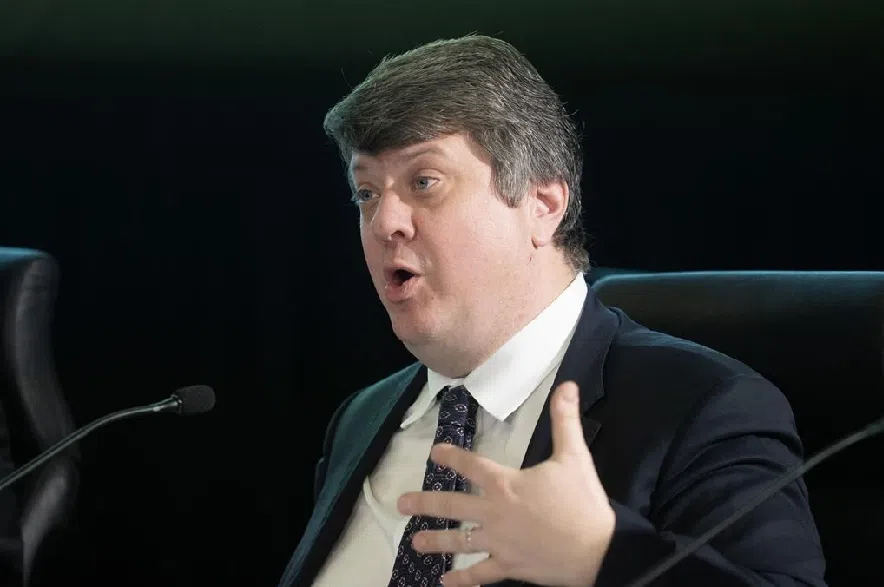OTTAWA — Prime Minister Justin Trudeau expressed frustration to a federal inquiry into foreign interference that intelligence leaked to the media had been sensationalized.
In a classified February interview with the commission of inquiry, Trudeau said it was extremely damaging to the confidence of Canadians in the democratic process.
A public summary of the interview was disclosed Wednesday at the inquiry, where Trudeau was testifying at an open hearing.
The summary says Trudeau observed that the leaks were “particularly frustrating” because the Liberal government had put in place robust mechanisms to detect and combat interference, yet it was “painted as negligent in the media.”
“PM Trudeau also considered that the leaks illustrate the dangers of drawing conclusions based on a single piece of intelligence, without sufficient context, and without any analysis of its reliability.”
Allegations of foreign interference in the last two general elections — suggestions fuelled by anonymous leaks to the media — led to a chorus of calls for the public inquiry.
During the hearing Wednesday, Trudeau reeled off a list of measures his government had taken to address foreign interference since assuming power in 2015.
Trudeau’s appearance follows several days of testimony from members of his cabinet, political party representatives, senior bureaucrats and intelligence officials.
Under a protocol ushered in by the Liberals, there would be a public announcement if a panel of bureaucrats determined that an incident — or an accumulation of incidents — threatened Canada’s ability to have a free and fair election.
There was no such announcement concerning either the 2019 or 2021 general elections. In both ballots, the Liberals were returned to government with minority mandates while the Conservatives formed the official Opposition.
The inquiry has already heard that China and other state actors attempted to interfere, but there has been little evidence so far to indicate whether they were successful.
The former minister of democratic institutions said she was told after the October 2019 federal election that Canada’s spy agency had seen low-level foreign interference activities by China.
Karina Gould, who held the portfolio from early 2017 to November 2019, said in a classified interview last month that the Canadian Security Intelligence Service indicated the activities were similar to what had been seen in the past.
“That foreign interference did not affect Canadians’ ability to have a free and fair election,” says a public summary of Gould’s interview.
Gould, now government House leader in the Commons, is on parental leave.
As democratic institutions minister, she oversaw design of the protocol for making a public announcement about electoral meddling.
She told the inquiry Wednesday that if Canadians are to be informed “that a foreign actor has interfered in our election, the threshold needs to be high.”
Before any public announcement from the panel, “they need to be certain that this is something of significant enough value” to the national interest that it be made public, she said.
Gould said the process was designed to allow for a public announcement due to meddling at a national level or “something that’s happening in one, singular riding.”
“It could be either,” she said. “Canada doesn’t have one national election, we have 338 individual elections that make up an electoral event. And so everything is context-specific.”
Dominic LeBlanc succeeded Gould as the cabinet minister responsible for democratic institutions after the Liberals returned to power in 2019.
He was asked to review how the measures she implemented worked in practice.
In that role, LeBlanc rarely received classified intelligence, but he said Wednesday he was given a “sufficiently precise” understanding of the “threat landscape” by the Privy Council Office, which worked with the national security agencies.
“I had every confidence that I had all the information I needed,” he told the inquiry.
In his view, the plan Gould put in place worked.
Gould wasn’t briefed on irregularities in the 2019 nomination race in the Toronto riding of Don Valley North, where Han Dong was named Liberal nominee. She told the commission it was outside her purview as democratic institutions minister.
Dong left the Liberal caucus last year following media reports of allegations that he willingly participated in Chinese meddling and won his seat in 2019 with Beijing’s help — a claim he denies.
Bill Blair was told about the irregularities after the election in his role as public safety minister at the time, but Blair said in a classified interview with the commission that he “was not concerned.”
During the public hearings Wednesday, Blair said security officials had no additional supporting information. “They indicated to me that they did not, at that time, have other corroborating evidence in any way to substantiate that.”
Blair, now defence minister, also told the inquiry CSIS did not indicate that Dong had any knowledge of the irregularities. He trusted the spy agency to take the appropriate action, he said.
Jim Bronskill and Laura Osman, The Canadian Press







